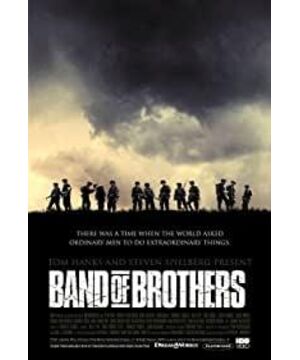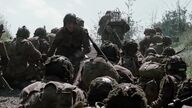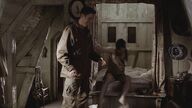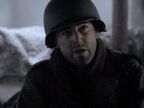Episode 3
[01:00:49] Character: Malarkey Location: Laundry,
shortly after the English troops returned to England from France, the order came down to request to return to France and not to return to England. Before returning to France:
Miss Lamp: Would you like a cup of tea?
Malarkey: No, no, thanks, I'm in a hell of a...a bit of hurry but thank you anyway
. The language is always vulgar, mixed with a lot of swear words, but in front of the British lady I like, I know how to restrain.)
[00:50:05] Character: Blithe Location: Battlefield (the battle is over)
B falls into the battle again before the battle Exhausted, it was not until Dick Winsters walked to his side and yelled at him to attack Wu Song, and set an example, and when he was beside him and shot at the enemy, B had the courage to raise his gun and go into battle like an epiphany. At the end of the battle, B walked towards the opposite side of the battlefield like a wandering soul, looking for the corpse of the enemy he had just aimed and shot. A small white flower was pinned to the corpse's uniform pocket. The flower only grew on the highest part of the Alps, indicating that he was a real soldier. He really went to such a high place to pick flowers. B silently took off the floret, not in front of his chest. (At the end of this episode, B volunteered to lead the team to inspect the front, and as soon as he walked out of the team, he was shot in the neck and was seriously injured. End credits: B never recovered and died in 1948.)
B's abnormal performance is out of fear. Everyone has fear in the face of war or other major changes, the difference is only in the magnitude and duration. After the fear period, people will adapt/numb their eyes, and be able to make their own interpretation of their environment (approximately "worldview"), and then act according to the laws corresponding to this interpretation ("methodology"). This rationalization of the incident is actually a psychological protection mechanism that allows oneself to accept the incident and form a way to deal with the accident. It's also a subconscious way of trying to understand the environment: interpreting the environment, reading it, and finding a way to deal with it.
Different people interpret the same environment in different ways. For example, in the face of the war, Harry, who comforted B with wine, said that the whole war was just a ball game, a football game, and both sides were advancing yard by yard. With such an interpretation of the war, H's purpose in the war is very clear: to reach the opponent's bottom line and score touchdowns. As for Lieutenant Speirs who shot and killed the captive soldier, he told B to treat himself as a dead man, so that there would be no fear, compassion, weakness, so that he could really play his role as a soldier. For S, in the war, everyone's fate is no longer certain, people die every day, you survived, but the person who was brought down by the enemy's sniper by your side may actually be replaced by you, so that you You have already died, and this is random, everyone is like this, so when you enter the war, everyone is equivalent to handing over their lives, and every day you live is earned. In these earned days, you You will not be so afraid, and you will be more aware of what you should do: defeat the enemy, defend your ancestors, protect your brothers, and achieve military glory... This is the explanation S gave to himself.
Everyone will have such a protection mechanism. Some people are stronger. Under extreme conditions, they still find an entry point to interpret the environment and preserve their minds. These people are those with strong wills, and we call them psychologically strong. It can be seen that there is a close relationship between intelligence/flexibility and mental strength. It takes a little longer for some people to switch from fear to interpretation mode; if they can't interpret, their psychology has always been in conflict with the environment. The longer the time is, or the stronger the conflict, the expression of B is like this.
B just hadn't crossed that threshold. When Winsters shot with him and kept urging him, he didn't know what happened, and he crossed it - he had his own understanding and explanation of the war. We don't know exactly what it was, but his eyes became firm and fearless, and later he bravely applied to lead the team and act as the vanguard. His purpose became clear, and his actions became generous and firm.
Looking back, we can conclude that the cause of the previous B is too weak / poor psychological endurance / too long fear period. However, at this point, I would like to offer another interpretation.
Innocent. The innocence and simplicity of B's character. H told him about his "ball game war" theory, which he didn't understand, and his "What is it (a game)?" implied that he couldn't simply equate such a life-threatening, cruel and terrifying war with a ball game. S told him to "treat himself as a dead person", and he obviously couldn't accept it, otherwise he wouldn't fall into hysteria again when the battle the next day started, and his fighting power would be completely useless.
In my opinion, in this episode, from B's point of view, the subtext is: war is war, it has death, pain, it is so hideous and ugly, you can't rationalize it. B doesn't understand how you can rationalize a war and then accept it. Rigid and dead eyes, one is one, how can it not be two, this is naive.
In the second half, B stopped panicking and went into the battle. After the battle, he was in a trance again. He picked up the small white flower on the enemy's corpse and pinned it to his pocket. At first, I thought it was the growth/degeneration of a soldier, from then on B would be able to face the war as unscathed as S or H, but instead he went to the enemy he shot and killed-- He still cares that it is a human life, he has learned to interpret and adapt to the environment, he has become stronger, but he still has the original innocence. Don't be a little flower, I don't think it means that he wants to be a powerful soldier, but that after the death of one side has eliminated the confrontation between the two sides, he expresses his respect for the other side and respects the other side's military glory from the perspective of the same soldier. And "military glory" should be connected with the theme of the whole play.
So, in fact, we can do our best to keep the original innocence and pure trust while growing stronger. Of course it can only be the small but most important part, because innocence is really our enemy. Of course, for you who have learned to be realistic, it is a matter of opinion whether keeping this innocence will make people more tormented than completely abandoning it.
View more about Band of Brothers reviews










